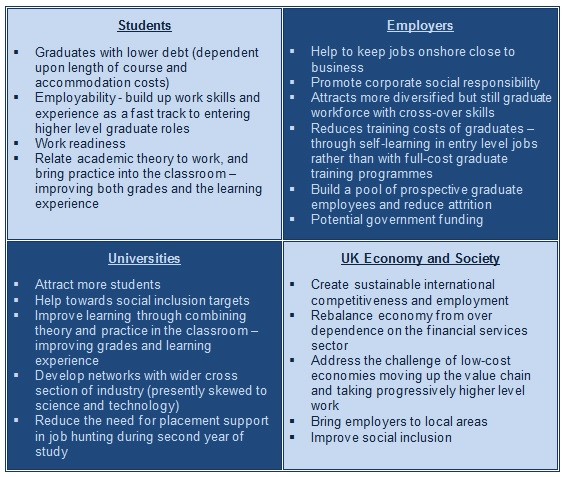How to prepare students for the job market is becoming an essential part of how universities can prove they are value for money and value for our students. Yet, the job market is uncertain and fast changing. Ian Herbert shares with us how the ‘Earn to Learn’ (EtoL) scheme is enabling the University of Loughborough to provide students with work experience by collaborating with organisations and policy makers.
In a thoughtful piece, ‘Is anybody out there? Brian Hipkin makes the point that the present perceptions of high levels of graduate employability ‘as proudly proclaimed on university buses’ might look very different when a new central approach to gathering the data starts in 2019. Universities, therefore, need to create innovative ways to train and educate their students for a fast changing and uncertain workplace.
Research findings by the Global Sourcing Research Interest Group at Loughborough University indicate that in terms of graduate entry to business professions such as finance, human resources, IT and procurement, opportunities for young people to ‘get in and get on’ are under pressure. These professions form the bedrock of business support services within organisations, but in a digitally-enabled global economy most of the entry-level work can now be performed anywhere in the world, or else eliminated through robotic process automation (RPA).
In the globalised, knowledge-based economy, the progressive decline of the professional ‘training nurseries’ shows four clear trends for professional careers within organisations.
First, operational (transactional) tasks, enabling students to learn the skills, knowledge and behaviours required for a life-long professional career, are being eliminated through process re-engineering.
Second, the remaining work is now standardised and commoditised so that computers can control the workflow and monitor quality, and enable it to be relocated to cheaper offshore locations without loss of control.
Third, robotic process automation (RPA) is poised to turn offices into the sort of ‘lights-out’ processing facilities that were pioneered by manufacturing companies 20 years ago. RPA will apply to both low- and middle-level work.
Fourth, if the entry-level jobs disappear then, in the future, the ‘talent pipeline’ to senior roles such as business partner will dry up. These roles require deep experience of organisational systems, procedures, protocols and people, along with the ability to apply the professional techniques and knowledge gained in those entry-level positions.
A possible solution ‘Earning to learn’
To address these concerns, at the University of Loughborough, we have worked with organisations to design a scheme to encourage the employment of undergraduates throughout the course of their degree programmes. The ‘Earn-to-Learn’ (EtoL) scheme aims to provide students with a good quality work experience that helps them to learn the craft of their chosen profession while studying. The scheme aims to:
- Create sustainable skills for future graduates
- Develop workforce capabilites in collaboration with businesses and organisations
- Fostering relevant curricula in HE, and
- Relieving student debt
The EtoL scheme aims to bring together organisations, consultants, outsource providers, policy makers, educationalists and the UK Department for International Trade, to help students become work-ready on graduation and thus, able to compete globally. We do this by helping students, employers and universities to appreciate how part-time work in business environments alongside academic study can provide valuable professional knowledge which forms the basis for life-long career.
EtoL will bring benefits to students and stakeholders as shown in the diagram below:









